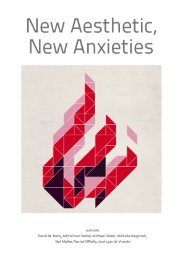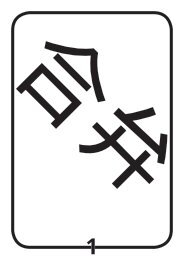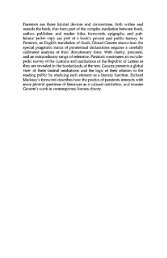Create successful ePaper yourself
Turn your PDF publications into a flip-book with our unique Google optimized e-Paper software.
Edouard Glissant<br />
Poetics 01 Relation/ /1990<br />
Influenced by Deleuze and Guattari's A Thousand Plateaux (1980), which advocates<br />
an incessant subversion of power via 'deterritorializing' gestures, the French<br />
Caribbean author Edouard Glissant poetically argues for the active appropriation of<br />
colonial culture by the colonized, particularly on the level of language. In contrast to<br />
the culturally unifying concept of negritude, Glissant's Poetics of Relation (1990)<br />
advocates a unity understood as diverse and fluctuating.<br />
Errantry, Exile<br />
Roots make the commonality of errantry and exile, for in both instances roots<br />
are lacking. We must begin with that.<br />
Gilles Deleuze and Felix Guattari criticized notions of the root and even,<br />
perhaps, notions of being rooted. The root is unique, a stock taking all upon itself<br />
and killing all around it. In opposition to this they propose the rhizome, an<br />
enmeshed root system, a network spreading either in the ground or in the air,<br />
with no predatory rootstock taking over permanently. The notion of the rhizome<br />
maintains, therefore, the idea of rootedness but challenges that of a totalitarian<br />
root. Rhizomatic thought is the principle behind what I call the Poetics of<br />
Relation, in which each and every identity is extended through a relationship<br />
with the Other.<br />
These authors extol nomadism, which supposedly liberates Being, in<br />
contrast, perhaps, to a settled way of life, with its law based upon the intolerant<br />
root. Already Kant, at the beginning of Critique of Pure Reason, had seen<br />
similarities between skeptics and nomads, remarking also that, from time to<br />
time, 'they break the social bond'. He seems thus to establish correlations<br />
between, on the one hand, a settled way of life, truth and society and, on the<br />
other, nomadism, skepticism and anarchy. This parallel with Kant suggests that<br />
the rhizome concept appears interesting for its anti-conformism, but one cannot<br />
infer from this that it is subversive or that rhizomatic thought has the capacity<br />
to overturn the order of the world - because, by so doing, one reverts to<br />
ideological claims presumably challenged by this thought.<br />
But is the nomad not overdetermined by the conditions of his existence?<br />
Rather than the enjoyment of freedom, is nomadism not a form of obedience to<br />
contingencies that are restrictive? Take, for example, circular nomadism: each<br />
time a portion of the territory is exhausted, the group moves around. Its function<br />
is to ensure the survival of the group by means of this circularity. This is the<br />
GlissantjPoetics of Relation/ /71








